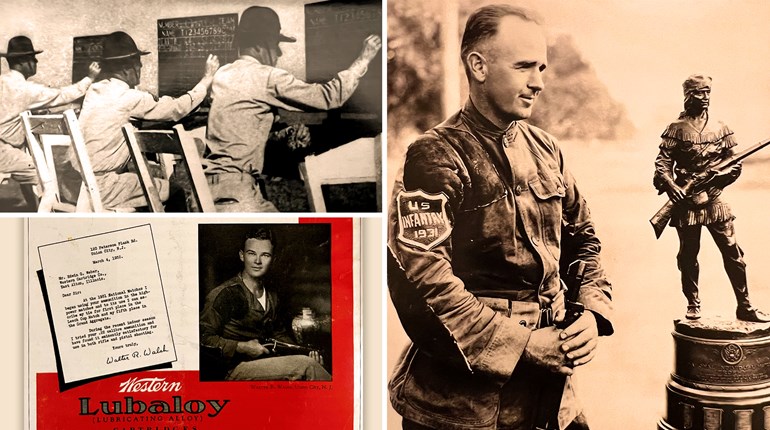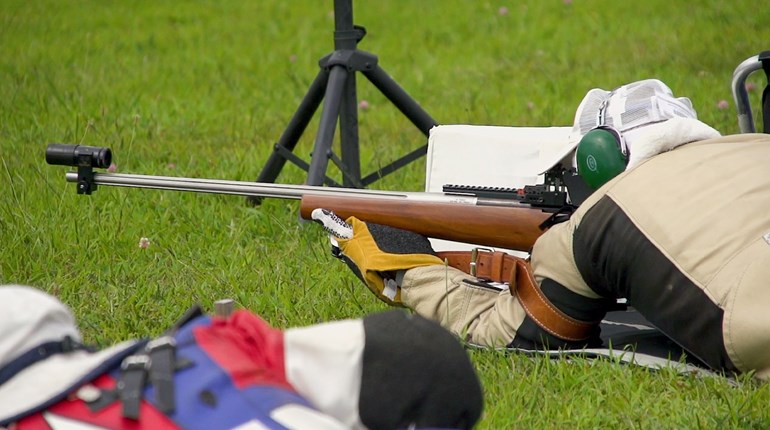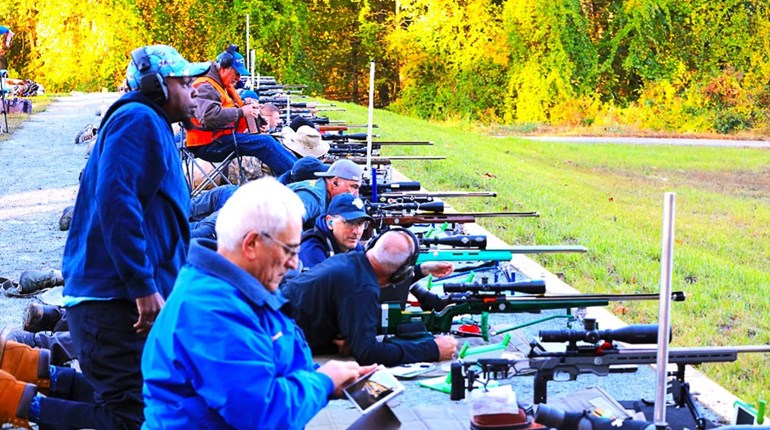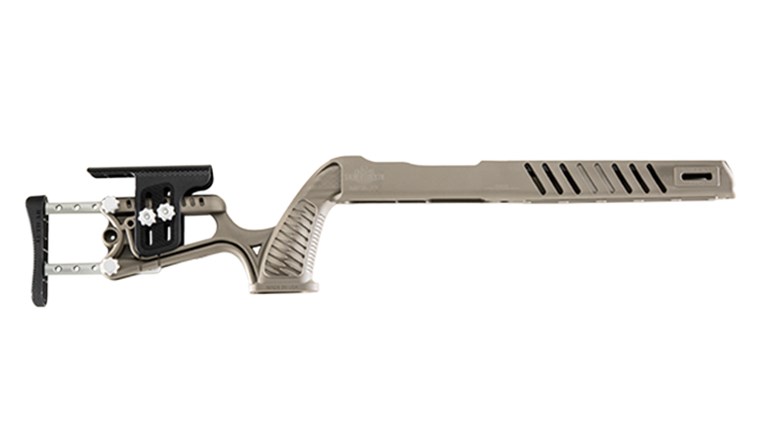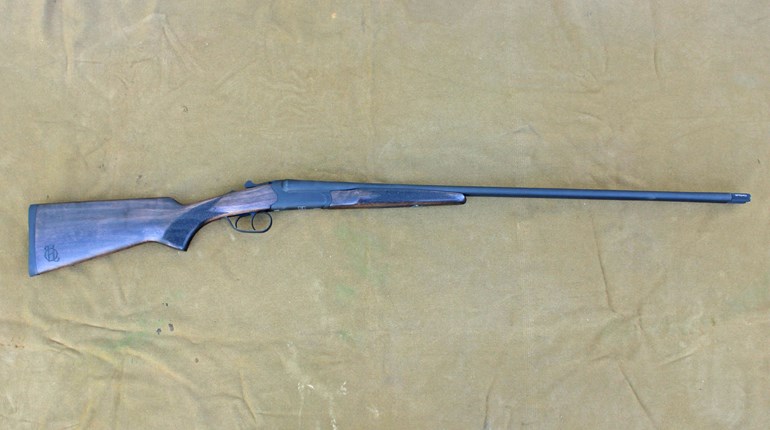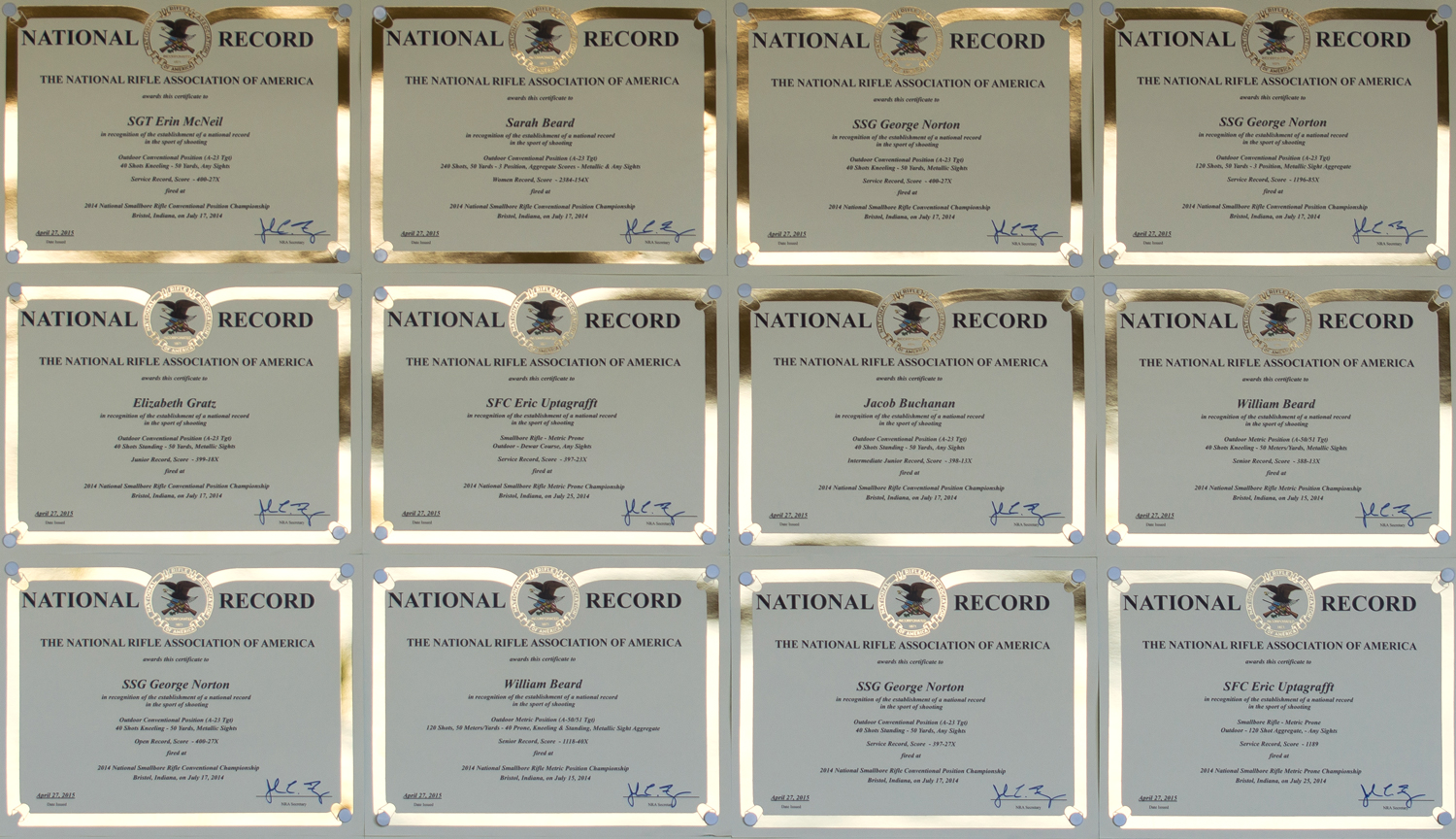
One of the most coveted certificates a competitive shooter can earn is a NRA National Record. A National Record signifies that a competitor has performed at a level never reached by others. The significance of the National Record is validated by none other than the NRA Secretary. National Records are not to be taken lightly and recognize a level of competitive marksmanship equaled by no other.
Qualification
For scores to qualify for a NRA National Record, they must meet special criteria that is found in each NRA Rule Book. Currently, NRA manages approximately 7,500 National Records for various courses of fire and categories of shooters, and each record is individually validated to ensure that a record meets the rule book criteria. So how does an outstanding performance get recognition as a National Record performance?
 The process starts off as a tournament, and not just any tournament. NRA National Records must be fired in NRA Registered tournaments. Today, anyone can shoot in an NRA tournament, but not everyone can set an NRA National Record. In NRA Registered Smallbore Rifle tournaments, for example, only U.S. Citizens, who are NRA Members or Junior members of NRA-affiliated clubs may be recognized for NRA National Records, while NRA High Power Rifle National Records are open to any NRA Member. There is also a requirement that for any NRA National Record to be valid there must be competition, meaning there is more than one competitor or one team in an event.
The process starts off as a tournament, and not just any tournament. NRA National Records must be fired in NRA Registered tournaments. Today, anyone can shoot in an NRA tournament, but not everyone can set an NRA National Record. In NRA Registered Smallbore Rifle tournaments, for example, only U.S. Citizens, who are NRA Members or Junior members of NRA-affiliated clubs may be recognized for NRA National Records, while NRA High Power Rifle National Records are open to any NRA Member. There is also a requirement that for any NRA National Record to be valid there must be competition, meaning there is more than one competitor or one team in an event. There are many other specific rules when considering NRA National Records regarding the conditions of the event as well.
Two examples are:
- National Records may not be established during reentry matches.
- Outdoor matches may not be fired under artificial light.
Thus, reviewing the rules before identifying a score as a National Record is always a good idea.
Another important document that can determine whether or not a score will qualify is the tournament program. The tournament program is required because it will list the tournament courses of fire and identify which matches are scheduled to be shot. Only scores for completed matches and recognized courses of fire (as identified in the program) may be considered, scores fired in stages or scores fired in only part of a match are not eligible. If a program, for example, describes that a three-position tournament has only one match (the Aggregate), then only one course of fire, the aggregate, is eligible for a record. However, if the program identifies that each position that makes up the aggregate is a match eligible for awards, then all three positions and the aggregate are eligible for NRA National Records.
Furthermore, there are two main areas, metallic sights and any sights that are recognized as national records. Scores using metallic sights, as defined by NRA rules are accepted as NRA National Metallic Sight Records. Scores fired using any sights (telescopes or metallic sights), as defined by NRA rules are considered for NRA Any Sight National Records. Scores that are shot in any sight matches are not eligible for metallic sight records even though the competitor fired the course using metallic sights. The rules now allow scores fired in individual matches to be used for team records (Paper Teams), however scores fired in a separately fired team match are not recognized for individual records.
As a result, qualifying scores can be submitted for special NRA National Record recognition. Special group records, (Open, Civilian, Regular Service, Reserve and Reserve components including the National Guard, Colligate, Woman and Junior categories) are recognized by the rules. Special group team records are also recognized providing all of the shooters are members of that group.
Meeting the Criteria
So how does a national record performance meet all of the above criteria? The process begins with the running of the tournament. An NRA Referee or a Jury is required for all NRA Approved or Registered tournaments. As a part of their job, the Referee or Jury must observe the conduct of the tournament to ensure that the tournament officials are following NRA Rules.
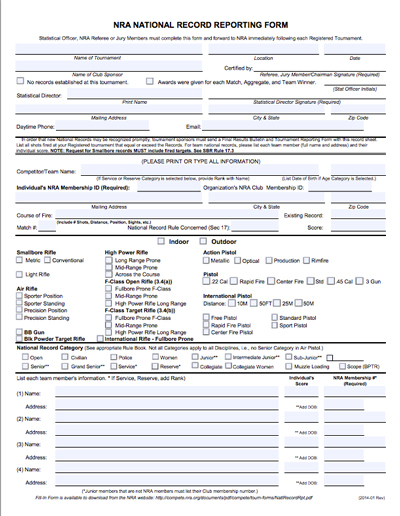 When the Statistical Officer and staff score the targets and identifies that a competitor has fired a score that equals or exceeds a listed National Record, a NRA National Record Reporting Form is completed and given to the Referee or to a jury member (Jury Chairman for High Power only) who will certify that the score was shot in accordance with NRA Rules. Then, the Statistical Officer will validate the competitor’s NRA membership, complete the NRA Tournament Report showing the Referee or Jury member’s signature, and generate the final Tournament Bulletin showing the results of the tournament. The Statistical Officer will then send the required reports, score cards, scored targets and backers, and the National Record Forms (smallbore or air rifle) to the National Rifle Association. National Record Forms not postmarked within 30 days from the tournament will NOT be considered.
When the Statistical Officer and staff score the targets and identifies that a competitor has fired a score that equals or exceeds a listed National Record, a NRA National Record Reporting Form is completed and given to the Referee or to a jury member (Jury Chairman for High Power only) who will certify that the score was shot in accordance with NRA Rules. Then, the Statistical Officer will validate the competitor’s NRA membership, complete the NRA Tournament Report showing the Referee or Jury member’s signature, and generate the final Tournament Bulletin showing the results of the tournament. The Statistical Officer will then send the required reports, score cards, scored targets and backers, and the National Record Forms (smallbore or air rifle) to the National Rifle Association. National Record Forms not postmarked within 30 days from the tournament will NOT be considered.When the paperwork is received, a date stamp is put on the documents and, after ensuring that the fees are paid, the paperwork and targets are forwarded to the appropriate department for processing.
NRA Competitive Shooting has the responsibility to ensure that each record is verified. When the paperwork is received by the Department Manager, he/she reviews the forms for completeness and accuracy. If the forms are not complete, or properly signed, or the targets and backers (smallbore and air rifle) are not present, then the package is returned to the tournament Statistical Officer with a letter describing the problems. A copy of the letter is also mailed to the competitors to inform them regarding the status of their proposed record. If these problems can be fixed by the tournament Statistical Officer, the paperwork may be returned to the NRA and the record will be processed.
The NRA Rifle Department’s Lois Wenzell processes about 600 NRA National Records annually. When asked how long it takes to process a National Record, she said, “If we have all of the paperwork and everything is correct, it takes just a matter of days or about a week or two to process a National Record. The most common errors are that not all the forms are completed or that the right validation signatures are not on the forms. It can take months to process a record if we have to contact the sponsor for corrections or for missing paperwork and will cause a delay in processing succeeding records for the same course of fire.”
Verification and Certificates
The verification process includes not only reviewing the paperwork, but for Smallbore and Air Rifle for example, NRA rules requires that the shot and scored targets be reviewed for correctness. Target verification requires that the targets have to be reviewed to ensure that they were scored properly and that the math is correct. That means that the targets may have to be re-scored.
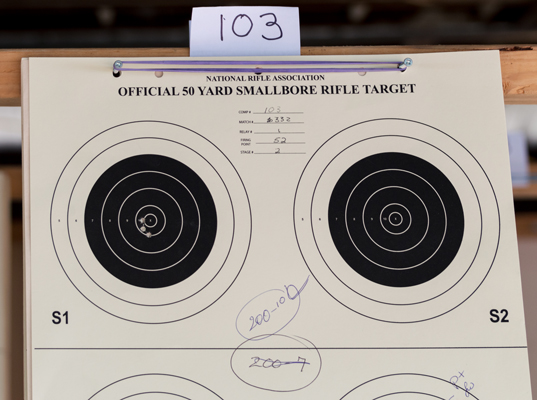 When asked why this verification was necessary, HQ Moody the NRA National Rifle Manager said, “I reviewed a set of targets recently that was scored by three scorers. When I picked up the first target and looked at it, the target was scored as a 98. As I looked further, the first three shots on the target were correctly scored as 8s with another two 9s. The correct score was eight points down or a 92; the scorers thinking “8,” wrote 98. Mistakes are made and we are required to verify the targets. National Records are just too important and we need to do everything we can to get them right.”
When asked why this verification was necessary, HQ Moody the NRA National Rifle Manager said, “I reviewed a set of targets recently that was scored by three scorers. When I picked up the first target and looked at it, the target was scored as a 98. As I looked further, the first three shots on the target were correctly scored as 8s with another two 9s. The correct score was eight points down or a 92; the scorers thinking “8,” wrote 98. Mistakes are made and we are required to verify the targets. National Records are just too important and we need to do everything we can to get them right.”Next, submitted scores are compared to current records and, if the submission equals or exceeds a record, the record score is put into the NRA National Record Database. If the score does not equal a record, a letter or email will be sent to the tournament Statistical Officer and the competitor, advising that the score does not qualify for an NRA National Record. The database is updated nightly so the competitor’s name and score will appear on the web site within 24 to 48 hours.
Finally, a NRA National Record Certificate is printed along with a letter of congratulations. The letter is sent to the Division Director to review and sign. Then the NRA National Record Certificate is sent to the NRA Secretary for signature. The certificate and letter are mailed to the competitor. When documentation is scanned, logs are updated, and the paperwork is filed the process is completed.
NRA National Rifle Manager HQ Moody added, “We must ensure that the rules are followed and verify that NRA National Records are being shot properly; we must be diligent in processing each record; and we must make sure that the whole process follows the guidelines and rules that were given to us by those who went before us. Without system integrity the NRA National Record system will provide nothing more than a meaningless piece of paper.”
To view NRA National Records, please go to compete.nra.org/national-records.aspx.













